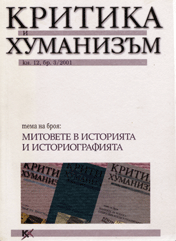Mitovete i vanshnopoliticheskite progarmi na balkanskite nacionalni darzhavi do Parvata Svetovna Voina
Myths and Foreign Policy Programmes of the Balkan Nation-States to the first World War
Author(s): Stoycho Grancharov, Antonina KuzmanovaSubject(s): History
Published by: Фондация за хуманитарни и социални изследвания - София
Summary/Abstract: A lot of the myths of the different Balkan peoples arise related to the national revivals and to the struggles against the Ottoman rule. Those myths recall some past state grandeur (e.g. the Serbian state apogee under Stephan Dushan, the grandeur of Byzantine, the union of Vallachia, Moldova and Transilvania under Mihay the Brave, the Bulgarian state magnificence under Simeon); those myths also magnify certain moments and persons taking part in the struggles against the Ottoman invasion (e.g. Stephan the Great, Vlad Drakhula, Mircha the Old, Milosh Obilich, Scenderbeck) and in the struggles for the preservation of the Orthodox faith (the brightest example is the canonization of the Montenegrian bishop Peter II Petrovich Negosh). One can say that in some cases those persons were far from the heroic features ascribed them by the myths. Rather it is the other way round - the brightest example here is Kraly Marco (as he is famous in the Bulgarian folklore) or Marco Kralevichy (as he is famous in the Serbian folklore) who actually participated in the battle for Kossovo in 1389 as a Turkish vassal. The myths however are good means to manipulate the mass consciousness for different political reasons. With regard to the Balkan nation-states myths used to serve for the justification of the foreign policy programmes. For example the Greek Megaly idea renders Greece to be a direct heir of Byzantine. The paper points out other myths integrated in the foundation of the foreign policy programmes of the other Balkan national states. Some of those mythically justified programmes are realized by the peace treaties after the First World War. But this does not go too far, at least not always. May be the most pronounced example is the disintegration of Jugoslavia.
Journal: Критика и хуманизъм
- Issue Year: 2001
- Issue No: 12
- Page Range: 135-149
- Page Count: 15
- Content File-PDF

